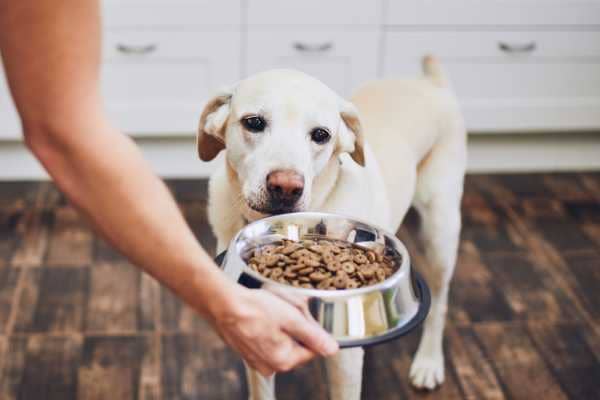Are you tired of your dog leaving unpleasant surprises around the house? Do you dread taking them on car rides because of their upset stomach? If so, it’s time to consider switching to sensitive stomach dog food.
Because let’s face it, cleaning up after your furry friend isn’t exactly a walk in the park. But don’t worry, finding the right food for your pup doesn’t have to be a daunting task.

With a little research and some trial and error, you can find the perfect formula that will leave both you and your dog feeling happy and healthy.
In this article, we’ll dive into what causes sensitive stomachs in dogs, how to choose the right food for them, and other ways to support their digestive health.
So grab a cup of coffee (or tea if that’s more your style) and let’s get started!
Key Takeaways
- Sensitive stomach in dogs can be caused by food allergies, intolerances, infections, or stress.
- Diet management is essential for managing symptoms and preventing complications, including choosing high-quality ingredients that are easy on the digestive system, avoiding allergens and preservatives, and considering age, breed, and weight when selecting food.
- Other considerations for sensitive stomach in dogs include exercise requirements, feeding frequency, probiotic supplements, hydration, and monitoring for signs of worsening symptoms.
- Choosing the right sensitive stomach dog food can provide relief for sensitive stomach without causing digestive upset and promote overall well-being and optimal nutrition.
Understanding Your Dog’s Sensitive Stomach
If your pup’s tummy is as delicate as a porcelain teacup, understanding their sensitive stomach is crucial. Sensitive stomach in dogs can be caused by various factors such as food allergies, intolerances, infections, and even stress.
Some common symptoms of a sensitive stomach include vomiting, diarrhea, gassiness, loss of appetite, and lethargy. If your furry friend is showing any of these signs or isn’t able to keep their food down for more than 24 hours, it’s important to consult with a veterinarian.
Diet management plays an essential role in managing your dog’s sensitive stomach. The right diet can help alleviate the symptoms and prevent further complications. Your vet may recommend a special diet that eliminates certain ingredients that trigger allergic reactions or digestive issues.
It’s important to follow the prescribed diet plan strictly and avoid giving them any table scraps or human food that may upset their tummy. With proper veterinary consultation and diet management, you can ensure your furry friend enjoys good health and happy mealtimes!
Choosing the Right Sensitive Stomach Dog Food
When it comes to choosing the right sensitive stomach dog food, there are several factors to consider. First and foremost, pet owners should look for high-quality ingredients that are easy on their dog’s digestive system.
They should also avoid certain ingredients that can trigger allergies or other gastrointestinal issues. Lastly, consideration should be given to a dog’s age, breed, and weight as these factors play an important role in determining the right type of food for their needs.
Ingredients to Look For
With a sensitive stomach dog food, it’s important to look for ingredients that are easy on your furry friend’s digestive system. This means avoiding ingredients such as corn, soy, and wheat that can cause gastrointestinal issues. Instead, opting for rice and lean proteins like chicken or turkey can help alleviate symptoms of a sensitive stomach in dogs.
In addition to these ingredients, it’s also beneficial to look for a sensitive stomach dog food that includes probiotics and fiber. Probiotics can aid in maintaining a healthy gut flora and improve digestion, while fiber helps regulate bowel movements and promote overall digestive health. By choosing a dog food with these added benefits, you’ll not only be providing relief for your furry friend’s sensitive stomach but also promoting their overall well-being.
| Column 1 | Column 2 |
|---|---|
| Happy | Sad |
| Healthy | Sick |
| Energetic | Lethargic |
Ingredients to Avoid
Steering clear of certain ingredients in your pup’s diet can make the difference between a happy, healthy pet and one who is constantly suffering. When choosing sensitive stomach dog food, it’s important to avoid common allergens such as wheat, soy, and corn. These grains are often used as fillers and can cause digestive issues for dogs with sensitive stomachs.
Preservatives should also be avoided in sensitive stomach dog food. Artificial preservatives like BHA, BHT, and ethoxyquin have been linked to health problems in dogs. Instead, look for natural preservatives like Vitamin E or rosemary extract.
Some owners may even choose to make their own dog food at home using fresh ingredients. This not only allows you to control what goes into your pup’s diet but also provides additional benefits such as better digestion and reduced risk of allergies.
Consideration for Age, Breed, and Weight
It’s important to keep in mind your pup’s age, breed, and weight when selecting the right nutrition for them. Different breeds have different exercise requirements and metabolic rates, which can affect their dietary needs.
For example, a small dog may require more calories per pound of body weight than a larger dog because they have a faster metabolism. Feeding frequency is also an important consideration when selecting sensitive stomach dog food.
Puppies may require more frequent feeding than adult dogs because they are still growing and developing. Older dogs may need fewer calories to maintain their weight and may benefit from smaller, more frequent meals to prevent digestion issues.
By taking into account your pet’s individual needs, you can choose a sensitive stomach dog food that will provide them with optimal nutrition without causing digestive upset or other health issues.
Transitioning Your Dog to Sensitive Stomach Food
To help your pup adjust to a sensitive stomach diet, gradually introduce the new food by mixing it with their current food over a period of several days. This slow transition will allow your dog’s digestive system to adapt without causing any discomfort or upset.
It’s important to monitor progress during this stage, so you can make adjustments if necessary. Aside from a slow transition, establishing a consistent feeding schedule and portion control is also crucial when transitioning your dog to sensitive stomach food.
Feeding at the same time every day and measuring out portions based on your dog’s weight and activity level can help prevent overeating and reduce the risk of digestive issues. With these tips in mind, you’ll be able to successfully transition your furry friend to a new diet that supports their sensitive tummy needs.
Supporting Your Dog’s Digestive Health
Maintaining a healthy digestive system for your furry friend requires paying attention to their overall wellness routine, including exercise and stress management. However, when it comes to supporting your dog’s digestive health, there are specific measures you can take to ensure they stay healthy and happy.
Here are three ways you can keep your dog’s digestive system in tip-top shape:
- Consider adding probiotic supplements to their diet. These supplements contain beneficial bacteria that help balance the gut microbiome and aid in digestion.
- Pay attention to feeding frequency and portion size. Overfeeding or underfeeding can cause digestive issues in dogs, so make sure you’re following recommended guidelines based on your dog’s breed and weight.
- Provide plenty of fresh water throughout the day. Staying hydrated is crucial for maintaining proper digestion and preventing constipation.
Give your furry companion the care they deserve with our specially crafted sensitive stomach dog food. We understand that some dogs have delicate digestive systems, which is why our premium dog food is thoughtfully formulated to be gentle and easy to digest. Packed with essential nutrients and wholesome ingredients, our specialized dog food not only supports your pet’s overall health but also addresses digestive discomfort.
By implementing these simple steps into your furry friend’s daily routine, you can help them maintain optimal digestive health and live a happier life overall.
Other Considerations for Dogs with Sensitive Stomachs
If you want to keep your furry friend feeling their best, there are a few additional factors you’ll want to consider when it comes to their sensitive stomach. One of the first things that you should do is consult with your vet. They can help you identify any underlying medical conditions that may be contributing to your dog’s gastrointestinal issues. Additionally, they can recommend specialized diets or prescription medications that may help alleviate symptoms.
In addition to consulting with your vet, there are also some home remedies that you can try to help soothe your dog’s upset stomach. For example, feeding them small meals throughout the day rather than one large meal can be helpful. You can also introduce bland foods like boiled chicken and rice into their diet for a few days until their stomach settles down.
Whatever approach you take, it’s important to monitor your dog closely for any signs of worsening symptoms and seek veterinary care as needed.
See also:
- Nutrisource Dog Food: Ignite Optimal Health with the Nutritional Powerhouse
- Can Dogs Eat Cilantro? Delight Their Well-being and Joy with this Nutritious Herb!
- Discover the Power of Nutra Complete Dog Food for Optimal Canine Nutrition
Frequently Asked Questions
Can sensitive stomach dog food also help with other health issues, such as skin allergies or joint problems?
Dog food designed for sensitive stomachs may also aid in skin allergies treatment and joint health management. However, it’s important to consult with a veterinarian to determine the best course of action for your furry friend’s specific needs.
Is it necessary to consult a vet before switching to sensitive stomach dog food?
Consultation with a vet is necessary when switching a dog’s diet. They can provide guidance on nutritional benefits and ensure any underlying health issues are addressed. Serving your furry friend’s needs starts with proper consultation.
How long does it typically take for a dog to adjust to a new sensitive stomach diet?
Like humans, dogs need an adjustment period when transitioning to a new diet. This can take anywhere from a few days to several weeks. To ease the transition, gradually introduce the new food and consider consulting a vet for additional transitioning tips.
Are there any potential side effects of switching to sensitive stomach dog food?
Potential risks of switching dog food include upset stomach, diarrhea, and vomiting. However, the nutritional benefits of a well-designed sensitive stomach diet can improve overall health and wellness for dogs with digestive issues.
Can sensitive stomach dog food be used as a long-term solution or should it only be used temporarily?
Switching to a specialized diet can have long-term benefits for dogs with persistent digestive issues. Nutritional value is key, so consult with a vet to ensure any dietary restrictions are met.
Conclusion
In conclusion, finding the right sensitive stomach dog food is crucial for maintaining your furry friend’s digestive health and overall well-being. It’s important to understand that just like humans, dogs can have unique dietary needs and limitations.
Think of it like a puzzle – each piece must fit perfectly in order to create a complete picture. Your dog’s diet is no different; every ingredient should be carefully selected to ensure their digestive system is functioning properly.
By taking the time to research and choose the best sensitive stomach dog food for your pup, you’re helping them lead a happy and healthy life filled with tail wags and cuddles. Remember, a little extra effort goes a long way when it comes to our four-legged friends!


